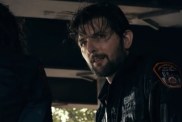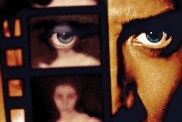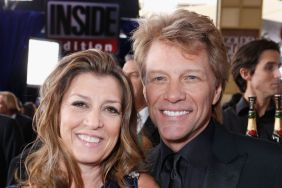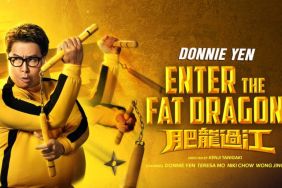Like Ian McShane, her co-star in The Seeker: The Dark Is Rising, Frances Conroy has become best known for a role she played in a long-running HBO drama, “Six Feet Under.” In the Fox Walden adaptation of Susan Cooper’s book, she plays Miss Greythorne, one of the Older Ones who helps Alexander Ludwig’s Will Stanton find the signs that will help him gain the experience with his powers necessary to fight The Dark and its minion, The Rider, played by Christopher Eccleston (“Dr. Who”).
ComingSoon.net: Could you tell us a little bit about your character and explain how you saw her in your head?
Frances Conroy: As everybody’s said, she’s one of the Old Ones. They are timeless. They are here to teach this young man who he is that actually place a very heavy burden on him at the age of 14. He has to save the world in twelve days, and I think that Miss Greythorne loves this child and wants to break him in as gently as possible because it’s terrible news to give him in a way. It’s sort of a shock. So I think that she’s a nurturer. I think she’s a teacher. I think as they all are, she’s omnipotent and they’ve been waiting forever for this moment. I mean in a sense for their savior to appear, the last of the old ones in this final battle.
CS: How do you get along with the other people in the production?
Conroy: It’s a wonderful group of people. Here we are in Romania and it has its own interesting things to deal with. I go around feeding dogs everywhere. I bring eight cans of food with me everyday. I’m taking one home. I’m trying to take another one home. They’re very nice. They just need food. And the guidebooks call them pesky and I think that’s such a cheap way of putting it. They’re these beautiful dogs that need some food and water, thanks to Ceausescu bulldozing people’s houses down and people throw their dogs out. You know, it’s an experience. It’s a beautiful movie. We’re far away from home all of us, and I’ve met some lovely people. I studied Romanian. I understand a tiny bit of what’s going on, and I think that David’s (Cunningham) doing a beautiful job with a large canvas. I think that what the books is sort of a relevant film to kids to come to the movie to want to come to the movie and find out who this boy Will is, and yet it has the essential ingredients of a story. The way the different characters play out in the five stories, if they continue with this in the two sequels, it will be interesting to see where they put each of us because all the characters aren’t in all the books, but they do play significant moments, parts in different moments of the books.
CS: You’ve read the books then?
Conroy: Oh yeah. I had to.
CS: Did you read them before or just when you got the part?
Conroy: I hadn’t read them beforehand. My sister had taught them to her advanced junior high school English class in the early ’80s. She thought they were beautiful books, and they were highly lauded when they came out. I read them when I found out I was going to do this. I thought it would be great to read them.
CS: Are you playing Miss Greythorne as being English or American?
Conroy: She’s English. Wonderful dialect coach was here.
CS: I guess we can dispense with the English accent between takes, so how do you jump in and out?
Conroy: Because when you’re a trained actress you know how to do that. That’s all there is to it.
CS: We don’t learn much about your character in the book but there seems to be a lot under the surface, so do we see more of that in the movie?
Conroy: I think that I’m playing the story that’s written in the text and that’s all I can play, but I’ve read the books so I have the mythology of the stories in my head. What’s written about her in the story informs me and how I might think of something at any given moment. Yeah, sure, there’s more to her. I think there’s more to Dawson and George as well as they stand there with their weapons and not saying much.
CS: This film has a great group of experienced character actors and also a number of inexperienced younger actors. Do you feel the need to take them under your wing when working with them? How does that relationship work between the older actors and the younger ones?
Conroy: Well, they are actors, and they’re young people playing young people, and they’re wonderful. Most of the scenes with the younger actors were within the Stanton family, so we didn’t have all that much to do with them in the story. Most of their scenes were shot towards the beginning. It was funny that the Christmas party in the manor house, they’re all there. And it was wonderful to be able to say hello to them within the story and welcome them to my house and offer them little things to eat, just to talk to them because I think that’s the only time I got to talk to them.
CS: I can’t recall you doing a fantasy type film before.
Conroy: No, I don’t think I have. Well, I was in “Catwoman” and that was sort of a fable in a way and that was humorous with all the cats climbing all over, and I was in that movie “Wicker Man” which I haven’t seen yet. It died a quick death, and that was an unusual story.
CS: Do you have to adjust what you do for a fantasy film? We were told that the film is trying for a sense of realism even though it’s fantastical.
Conroy: Yeah, it’s very human. I think that David (Cunningham) is keeping the special effects down to the most human level he can, which I think is nice because then it’s not virtual, it’s real. There’s flesh and blood behind it all and I think that makes a difference. I think even the sets make a difference that way. They won’t be totally computer-generated sets like this set. It’s actual. And both for the people existing within the world in a sense and the people watching it, I think that there will be a visceral reaction to the reality of it, the three dimensional quality to it.
CS: What’s your feeling about using CGI in film?
Conroy: I think it’s a clever game and it does absolutely nothing for me. I think it’s an absolute bore. I think it’s taken something very heady to such an extreme that it’s like a club that I definitely don’t belong to. I like things that are actual.
CS: How do the sets look compared with some of the other things you’ve done?
Conroy: The set is magnificent. My gosh. Have you seen all these sets? Astounding.
CS: Were you blown away?
Conroy: How could it not? They’re great. Just incredible.
CS: How amazed were you with the manor set they built?
Conroy: Oh yeah, yeah, just beautiful. The first scene we shot in there was a Christmas party. It was so pretty.
CS: We haven’t seen the inside, just the outside.
Conroy: Oh, well, it’s ruined now. It was beautiful.
Were you involved in the scene where it got immersed in water, and did you have to do any underwater work?
Conroy: I didn’t have to go under, but I was kind of moving through it and grabbing kids and trying to get out. I didn’t get dumped but I got pretty wet. I was so happy when our scene was over. It was disgusting. Your feet were wet within the plastic bags they put on your feet. It’s like ew.
CS: Was that the worst scene to shoot? Ian McShane spoke about having snakes crawling all over, was that your worst?
Conroy: No, I just didn’t think water in the shoes inside plastic bags was the most pleasant feeling for twelve hours. It was like, “Okay, let’s ring the socks and get wet again.” I had a snake around my neck. First, they put a big rubber one around my neck because it was a really real looking snake, and then they put the real 30-foot python around my neck. The little tail was going like this and I had to sort of hold it on, and the main snake handler was off to the side holding the head like this, so the snakes were interesting. There were thousands of them and below me, around my feet were most of them in a circle and then they took up little barriers and they were crawling a little bit. Yeah. Ian, and Jim and James had them on them.
CS: When you signed for a movie like this, you know that you’re going to be doing this kind of stuff, so is the impetus for doing it because you like the character?
Conroy: Oh yeah. I thought that it was a wonderful character. I first auditioned for Mrs. Stanton, but I had a funny feeling that I was going to get called in for this part and I sort of hoped I would be. And so it was very cool to think that I’d be playing her because I think she’s a mysterious lovely character. And in the book, she’s Miss Greythorne in this book, but she’s greater than that. She’s known as the Lady in one of the books. All around the world are waiting for the Lady to come and bring sign. So it’s quite beautiful and huge, the dimension that each of these character has is unique.
CS: Are you doing any of the action at all?
Conroy: I have a fantastic turn where I pull a sword out of my walking stick and slice a bird in half. It’s fun, and I have a coat that billows as I do this turn, and that turn.
CS: Is this the most action you’ve done in a movie so far?
Conroy: I would think so, and now I’m going to use my whip on the Rider, on Chris Eccleston.
CS: Vin Burnham, the costume designer, showed us some of those costumes. How much do they help with the character?
Conroy: They’re such beautiful costumes. It’s so interesting what she did and chose. I went to London and tried on some wonderful things and made copies of them, like the coat that I wear when we’re battling the snakes, just the way it flows is so beautiful and they evoke a kind of a time. The gown that I wear at the Christmas party, it’s this beautiful gown that’s made with a technique called Devore. I don’t know how they did with this dress. But just clothes that are evocative immediately as you see them and wear them. It’s just wonderful. Yeah it’s an interesting palette that she chose for all of them.
CS: Do they give the actors any input into the costumes they wear?
Conroy: They always ask you that, because if you hate what you have on, you’re not going to be very happy. If it feels wrong or something can immediately look wrong, everybody goes, “No, take it off.”
CS: You mentioned not having done a lot of fantasy, but one could argue that you spent several years doing “Six Feet Under,” which was really a sort of a fantasy wasn’t it?
Conroy: Yeah, I suppose. Alan Ball’s magnificent take on life and death
I mean what is a fantasy? I guess it could be anything. It just depends on what the special effects are that you’re dealing with to make it a quote, unquote fantasy. I think of this as a fable, a fairytale in a sense with some pretty deep tones to it around a young man, a boy going into manhood with time shifting back and forth.
CS: Do you know what you’re doing after you’re done with this?
Conroy: I think we’re glad to go home. I’ve been gone since February.
CS: You stayed here the whole time?
Conroy: I had a two-week break, but then it got chopped up by schedule changes. And I thought, oh, I guess I’m not going home.
CS: You’re not like Ian, who goes home every weekend?
Conroy: I’m in LA. I’m not in England. It’s not a three-hour trip. More like a 24-hour trip. I’ve been doing a lot of e-mailing. Me, who hates computers, I’ve been doing a lot. I’ll go home. There are a couple of things I might do, but I want to go home and just see what I want to do.
CS: When you left “Six Feet Under,” did you make a conscious effort to do a bunch of projects that were as eclectic as possible?
Conroy: I’ve seen a couple of the movies that have come out. This wonderful one called “Humboldt County” that’s finished and they’re just doing some ADR on it, and a couple of other movies that haven’t come out yet. I think you just read things and choose and that’s always nice to have a choice to make.
CS: Would you ever jump back into television?
Conroy: I have no idea. I think that when you read things you just decide what you want to do. I think the rigors of a TV schedule are brutal and “Six Feet Under” wasn’t a network schedule. We did 13 shows, we didn’t do 22. I don’t know how people do that. I really don’t. I mean the shows are shorter, but wow, it’s quite a discipline. And I think that for us in the next to the last month, it was like, oh my god, we’ve got another five weeks of this, of just following the same line and getting up at 4:30 in the morning.
CS: Do you find that the film shoot is a bit more relaxed?
Conroy: It’s just different. It’s a different animal. I mean TV you’re going week to week to week, starting incredibly early and ending really late and then switching back and forth, so your time clock is totally screwed up for however many months you do it. Then I feel like you crawl out from under a rock when it’s done. But with a film, you’re in for a finite period of time. Like the Kiefer Sutherland movie is all night, so they’re going to be working nights for 12 weeks. That’s absolutely bizarre to me, that totally screwed up time clock, but it’s a finite thing, a shorter thing. Although the makeup and hair people worked on films that have gone on for six months. So whatever.
Back to the Main Interviews Page or check out the interview with Conroy’s castmate Ian McShane.










